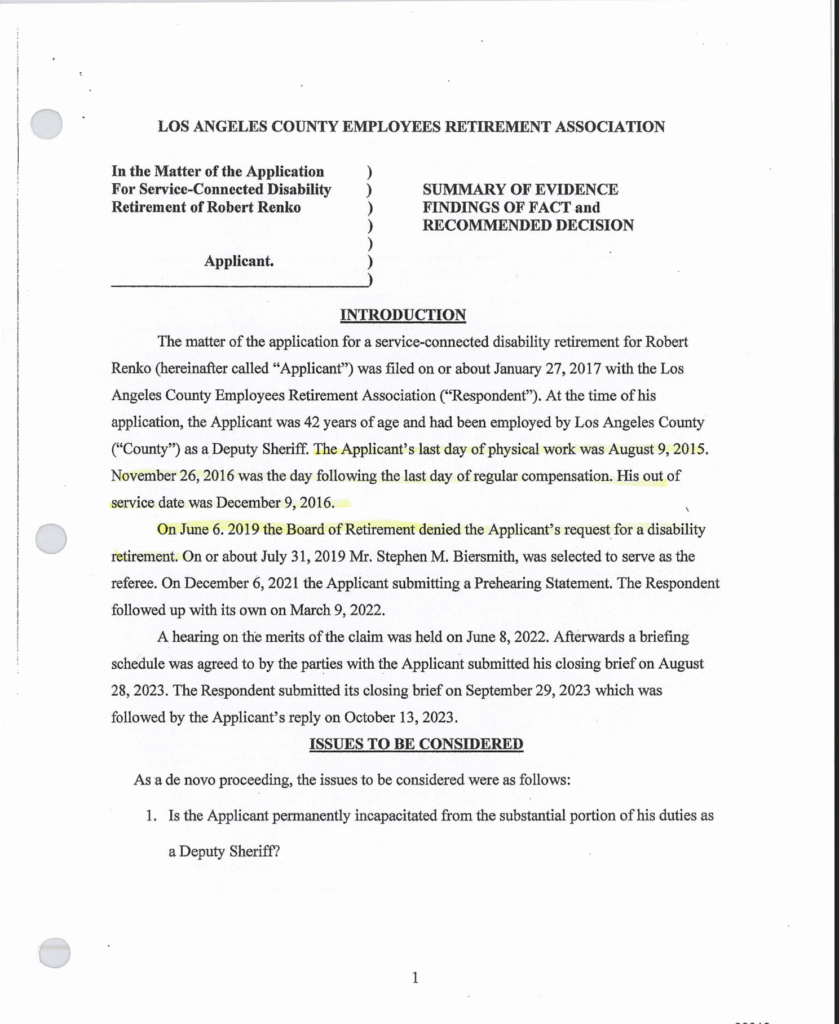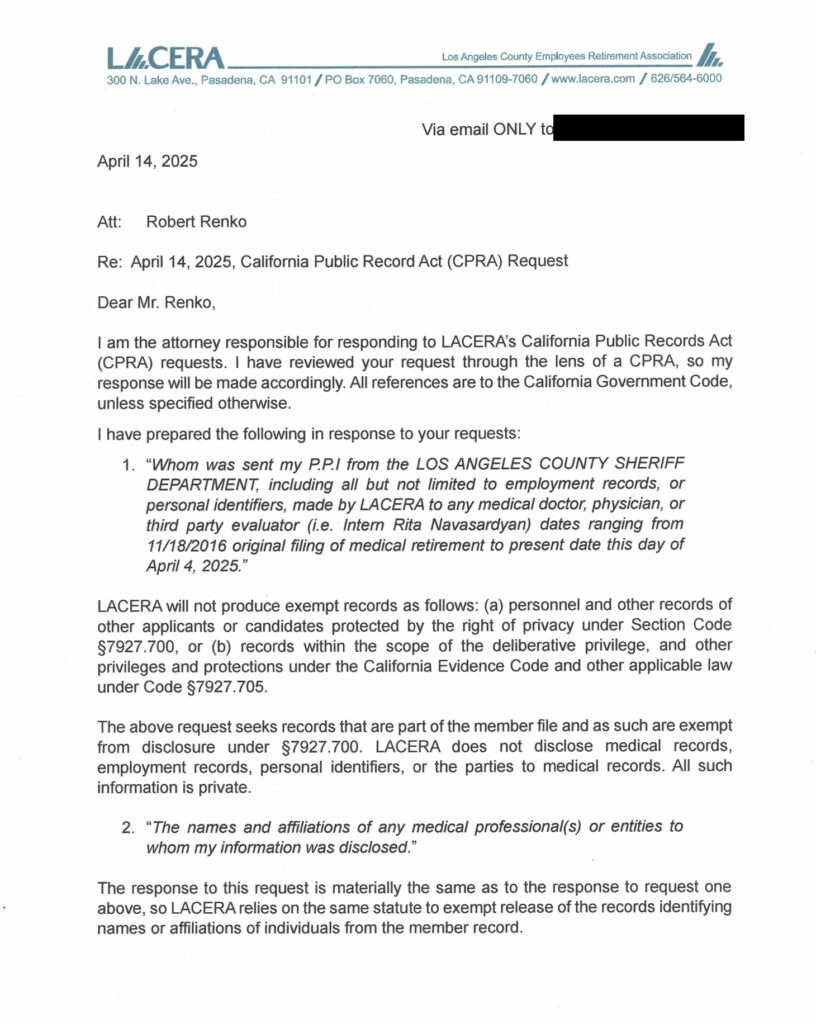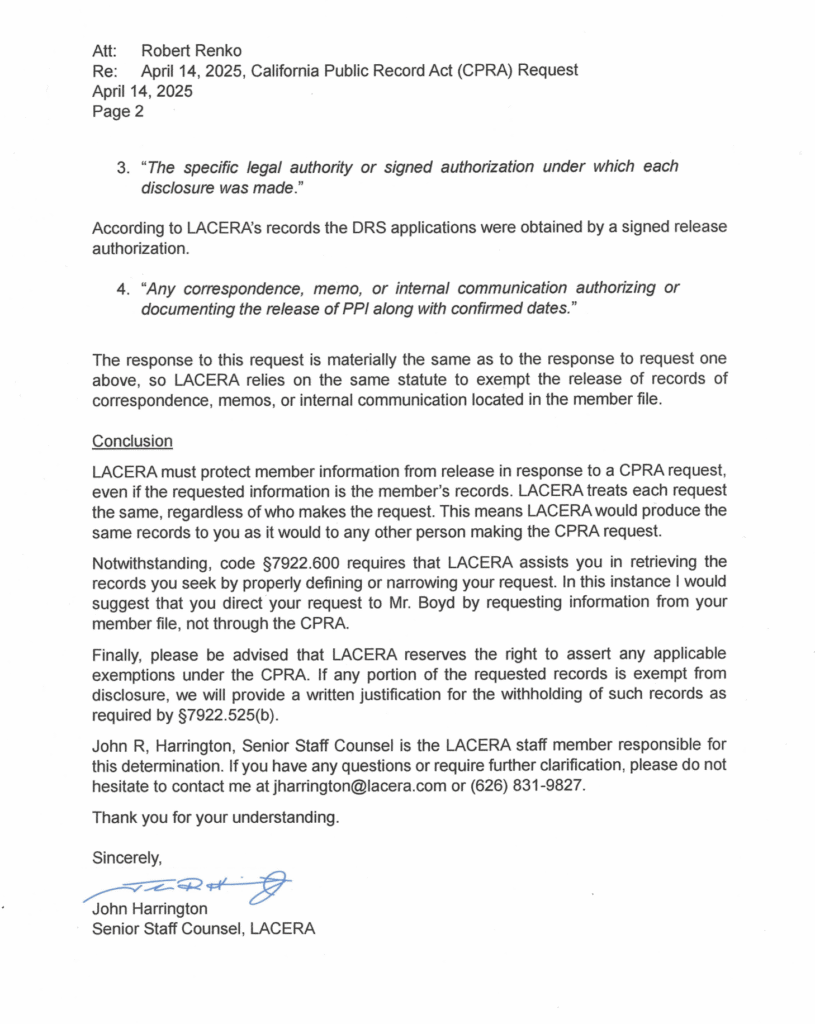In the dark underbelly of Los Angeles County’s bureaucracy, where paper trails are quietly altered, records mysteriously appear in the wrong hands, and those sworn to uphold the law weaponize it instead, one case is emerging as a blueprint for systemic abuse inside the Los Angeles County Sheriff’s Department (LASD) and its sister agency, the Los Angeles County Employees Retirement Association (LACERA).
At the center of it all: former LASD Deputy Robert J. Renko, a decorated officer injured in the line of duty, who found himself fighting not just for his health, but for his name, his pension, and his right to due process.
From Line-of-Duty Injury to Departmental Betrayal
Renko’s nightmare began in 2009, when a high-speed pursuit ended in a catastrophic crash that would define the next decade of his life. The wreck left him with severe spinal and orthopedic injuries, eight surgeries, a spinal fusion from C3 to C7, and a lifetime of pain managed through opioids like Hydrocodone and Oxycodone.
Despite multiple department physicians recommending medical retirement, LASD forced him to continue working, year after year, ignoring the risk to both Renko and the public. By 2016, his body had reached a breaking point.
On November 25, 2016, Renko officially filed for service-connected disability retirement with LACERA, a move that should have triggered immediate review under state law. Instead, it set off a chain of retaliation that would make any whistleblower’s blood run cold.
A Vindicated Victim – Then a Backdoor Termination
Just months before that filing, LASD’s Internal Affairs Bureau (I.A.) had launched an investigation into Renko following a domestic incident. But by the time the District Attorney’s Office reviewed the evidence, it was clear: Renko was the victim of domestic violence, not the perpetrator.
LASD leadership, including then, Sheriff Jim McDonnell, and legal counsel Diana Teran, refused to clear Renko. The I.A. file stayed open, hanging over him like a political noose.
When Renko’s Skelly hearing was finally held on November 4, 2016, then-Chief Joseph Gooden sided with justice and reinstated him. But just six weeks later, LASD secretly reversed its own decision, backdating a termination letter to December 9, 2016, and mailing it out a week later.
The backdating wasn’t an accident, it was a calculated maneuver to make an illegal firing appear legitimate on record.

The Setup: A Coordinated Sabotage Between LASD and LACERA
Renko’s reinstatement and pending medical retirement should have protected him. Instead, LASD conspired with LACERA to destroy his claim.
On December 12, 2016, just days before the backdated termination letter was mailed, LASD sent LACERA Renko’s full personnel and Internal Affairs files, branding the confirmed domestic violence victim as a criminal suspect.
These materials, never substantiated, never adjudicated, and never meant to leave LASD’s walls, were illegally shared with LACERA’s evaluating physicians. Within weeks, doctors who had initially approved Renko’s disability retirement reversed their findings after being fed the tainted I.A. data.
The result: LACERA denied Renko’s claim, citing “new information” that had nothing to do with his medical condition.
Evidence Tampering and Falsified Records
By early 2017, LACERA had altered Renko’s official filing date, moving it from November 25, 2016, while he was still employed, to January 27, 2017, nearly two months later. That fabricated date gave them the pretext to label his claim “post-termination,” effectively voiding his eligibility .
Renko’s digital signature was also reused without authorization, a move that violates both California Government Code §1222 and Penal Code §502(c), the same laws that criminalize falsifying or tampering with public data
The Smoking Gun: Internal Admissions and Stonewalling
In March 2019, LACERA’s own senior staff counsel, Francis J. Boyd, admitted that information about Renko’s termination had been improperly shared with medical evaluators, a clear breach of confidentiality laws .
When Renko pressed for answers, demanding to know who at LASD or LACERA authorized the unlawful transmission, LACERA refused, hiding behind “confidentiality.” Yet the same agency had no issue violating Renko’s privacy to torpedo his claim .
Pattern of Retaliation and Institutional Corruption
The Renko case doesn’t stand alone. It fits an unmistakable pattern of LASD’s internal retaliation culture, where loyalty to the chain of command outweighs law, ethics, or basic humanity.
This was the same era that saw LASD under McDonnell accused of data manipulation, falsified internal reports, and retaliatory investigations against whistleblowers. The fingerprints of Diana Teran, then a legal advisor at LASD, (and subsequently transferred to the District Attorney’s Office under George Gascon), appear in both spheres, raising serious questions about her continued influence over cases involving deputy rights and use-of-force policy oversight.
Now, nearly a decade later, Renko has taken his battle to court. His Request for Order to Show Cause, filed in Los Angeles Superior Court before Judge James C. Chalfant, accuses LACERA and LASD of:
- Unlawful transmission of confidential files, in violation of Penal Code §832.7 and Evidence Code §1040;
- Unauthorized computer access, under Penal Code §502(c);
- Conspiracy to obstruct justice, under Penal Code §182;
- And willful misconduct by public officers, under Government Code §1222 .
Renko’s court filings demand that both agencies disclose who shared the Internal Affairs file, who authorized it, and why a peace officer’s protected personnel record was used as a weapon in a disability proceeding.


The Human Cost
Behind the legal citations is a man whose life was dismantled by the very system he served. A deputy injured in the line of duty, cleared as a crime victim, and then vilified by his own department.
For nine years, Renko has lived in bureaucratic limbo, without pension, without recognition, and without accountability from those who destroyed his career.
A Call for Federal Oversight
As The Current Report has repeatedly documented, L.A. County’s internal oversight mechanisms, from the Civilian Oversight Commission to the District Attorney’s “justice reform” unit, are more interested in optics than accountability.
Renko’s case now stands as a test: Will Los Angeles County continue protecting its insiders, or will it finally hold its institutions to the same laws they enforce on others?
This isn’t just one deputy’s story, it’s a case study in how power protects itself.
When public officials collude to falsify records, leak confidential files, and destroy careers to cover their own misconduct, the entire foundation of justice collapses.
Robert J. Renko’s fight for his pension is no longer just about money.
It’s about exposing the machinery of retaliation that defines Los Angeles County’s most powerful agencies, one falsified record at a time.


Follow Us